Text
Quality Unveiled: Rajasthan Lime's Global Lime Market Presence
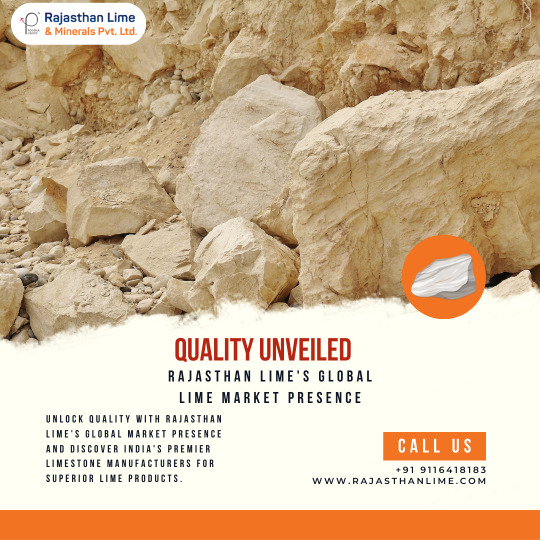
Introduction
Rajasthan Lime has set new standards of excellence in the lime industry with its unwavering dedication to quality and innovation. It has become one of the leading players worldwide in lime production and distribution. Their journey from humble beginnings to global powerhouse is proof of their dedication to excellence in their chosen field.
Rajasthan Lime: Creating Quality and Innovation
Since [year], Rajasthan Lime has been at the forefront of lime industry innovation. Boasting state-of-the-art manufacturing facilities and an expert team, Rajasthan Lime has consistently provided customers with superior-quality lime products that have earned their trust around the globe.
Best Lime Manufacturers in Jodhpur
Rajasthan Lime, situated in Jodhpur's historic city center, is one of the premier best Lime Manufacturers in jodhpur and surrounding regions. Renowned for its superior quality products, such as hydrated and quicklime, Rajasthan Lime provides an extensive array of solutions that suit various industrial applications.
Best Lime Powder Suppliers in Rajasthan
Rajasthan Lime is committed to offering only high-quality lime powder products and services. As one of the best Lime powder suppliers in Rajasthan, they ensure they meet stringent quality control measures to provide customers with only premium powder for their applications. With strict quality measures in place, customers can rest easy knowing they have purchased only premium-grade products for their applications.
Best Limestone Manufacturers in India
Limestone offerings make them one of India's leading limestone manufacturers. Utilizing their sizable high-grade limestone reserves, they produce superior quality products to meet industry requirements across industries like construction, agriculture and environmental applications - customers trust Rajasthan Lime's limestone products nationwide.
Quality Assurance: Committed to Excellence
For Rajasthan Lime, quality is more than a catchphrase - it's an integral part of their business philosophy. From procuring high-grade raw materials to implementing stringent quality control measures at every production stage, the company ensures its products meet the highest standards of excellence. Accreditations from leading regulatory bodies demonstrate Rajasthan Lime's dedication to quality.
Global Lime Market Presence
Rajasthan Lime has made an indelible mark in the global lime market due to its commitment to quality products. Boasting a strong presence in key markets worldwide, Rajasthan Lime continues to expand and consolidate its position as a trusted provider of lime products - from Asia to Africa and Europe; customers worldwide rely on Rajasthan Lime's products!
Innovation Is Key to Rajasthan Lime's Success
Innovation has always been at the core of Rajasthan Lime's success, as it invests heavily in research and development to stay at the forefront of customer needs and meet them effectively. From developing new products or improving existing ones to setting industry-wide benchmarks of excellence - innovation remains at its heart, and Rajasthan Lime remains committed to driving it further daily.
Conclusion
Rajasthan Lime's global lime market presence is a testament to its unwavering dedication to quality, innovation, and customer satisfaction. Recognized as one of Jodhpur's premier lime manufacturers, Rajasthan Lime continues to raise the standard in their industry by providing superior quality lime best limestone manufacturers in india products while continuously innovating new ones - leading the global lime market into the future.
#best Lime Manufacturers in jodhpur#best Lime powder suppliers in rajasthan#best limestone manufacturers in india
0 notes
Text
Rajasthan Lime Company: A Key Supplier to Copper Industries

Rajasthan Lime Company is an exemplar in copper mining lime solutions in India. It is known for its unwavering commitment to quality and innovation, making it one of the Copper mining lime solutions Rajasthan. Copper mining operations use Rajasthan Lime Company products as fuel for their operations - increasing efficiency, sustainability, and growth while contributing to India's industrial landscape. Here, we explore its role in supporting copper industry operations and contributing to India's industrial development landscape.
Understanding Lime's Importance in Copper Mining:
Lime is an integral component of copper mining operations, from ore extraction to metal refining. From mineral separation to controlling pH levels and increasing overall process efficiency, lime plays a pivotal role. Rajasthan Lime Company specializes in providing premium lime products explicitly tailored to meet the unique requirements of copper industries, providing optimal performance and productivity at every step in mining and refining operations.
Innovative Lime Solutions for Copper Industries:
Rajasthan Lime Company stands out as an innovative supplier of lime products for the copper industry, offering tailored solutions designed to address unique challenges in mining and smelting operations. From quicklime and hydrated lime to lime slurry and additives based on lime products, Rajasthan Lime Company delivers comprehensive lime solutions that meet stringent quality standards while improving process efficiency and the environment by minimizing waste and emissions.
Enhancing Ore Extraction and Processing:
Lime is an indispensable element of copper mining, used as a flotation agent to separate valuable minerals from gangue. Rajasthan Lime Company's products assist the flotation process by increasing the mineral separation efficiency, thus improving copper-bearing ore's recovery rates. Lime also plays an integral part in managing the pH levels of process water to create optimal conditions for flotation and subsequent processing stages.
Facilitating Metal Refining and Smelting:
Lime acts as a fluxing agent, aiding the removal of impurities while increasing the quality of final products. At Rajasthan Lime Company, high-purity lime products are vital components of the smelting process. They encourage the formation of slag that absorbs impurities from molten copper before being separated by gravity filtration, producing copper metal with superior purity and mechanical properties.
Supporting Sustainable Practices in Copper Mining:
Rajasthan Lime Company is dedicated to supporting environmentally responsible practices within the copper mining industry with their ecologically responsible lime solutions. Providing products that reduce waste generation, energy usage, and greenhouse gas emissions while simultaneously meeting operational efficiency goals while remaining profitable, Rajasthan Lime Company assists Best lime manufacturers for copper in Jodhpur in achieving their sustainability goals while remaining operationally efficient and profitable. Furthermore, Rajasthan Lime invests heavily in research and development initiatives that enhance the environmental performance of copper mine operations.
Collaborating for Industry Advancement:
Rajasthan Lime Company collaborates to foster industry advancement. Rajasthan Lime Company works closely with producers, research institutions, and regulatory bodies to support the expansion and development of India's copper industry. Through knowledge-sharing, technical assistance, and industry partnerships, Rajasthan Lime Company contributes towards improved mining practices and adopting cutting-edge technologies; ultimately, fostering collaboration and innovation is integral in shaping its future as part of its destiny as an industry.
Conclusion:
Rajasthan Lime Company has long been recognized as an invaluable partner and supplier to the copper industry, offering cutting-edge lime solutions that promote efficiency, sustainability, and growth. From ore extraction to metal refining processes, their high-quality lime products are pivotal in optimizing process performance and product quality improvement. As demand for copper continues to increase, Rajasthan Lime Company remains committed to supporting it with cutting-edge lime technologies and an unwavering dedication to excellence.
#Copper mining lime solutions Rajasthan#Best lime manufacturers for copper in Jodhpur#Copper industry lime products india
0 notes
Text
Bulk Lime Delivery: Ensuring Timely Service - Rajasthan Lime
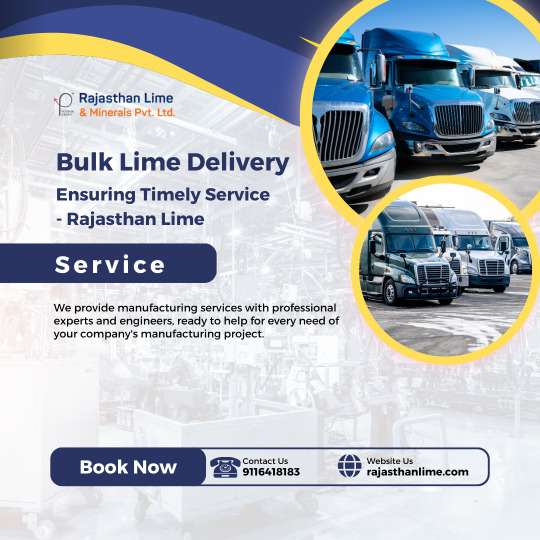
Rajasthan Lime, one of India's leading suppliers, specializes in bulk lime delivery to meet the specific needs of industries like construction, steel manufacturing, agriculture, and water treatment. Let's delve deeper into its significance and process while emphasizing its dedication to efficient service provision.
Bulk Lime Delivery Is Essential
Bulk lime delivery is crucial to industries that rely on large volumes of lime, from soil stabilization, steel production, water treatment, and construction projects to quicklime or hydrated lime applications. Lime comes in various forms, such as quicklime or hydrated lime, and plays an essential role in these fields of endeavor.
Rajasthan Lime is an expert supplier of reliable lime.
Rajasthan Lime is an outstanding provider of bulk lime in Jodhpur and across Rajasthan, distinguished by their commitment to quality, timely delivery, customer satisfaction, and robust infrastructure and logistics network, ensuring Lime delivery in bulk Jodhpur efficiently to meet the production schedules of clients.
Lime Delivery in Bulk: Process Overview
Bulk lime delivery requires several critical steps for efficiency and safety:
Order Placement: Clients place bulk lime orders with Rajasthan Lime, providing information such as quantity, delivery schedule, and type.
Lime Preparation: Based on client specifications, Rajasthan Lime prepares an exact quantity for each order to ensure quality control throughout production.
Lime is transported using bulkers or trucks specifically designed to transport bulk materials. Once loaded onto these bulkers or trucks, it is sent directly to each client site according to an agreed-upon delivery schedule.
Unloading and Storage: Once delivered to the client's facility, bulk lime is unloaded using appropriate equipment before being stored according to specific needs. Benefits of Bulk Lime Delivery
Bulk delivery offers many cost and efficiency advantages over smaller deliveries; transportation costs per unit of lime are reduced significantly, while continuous supply guarantees reduced production downtime and maximized operational efficiencies.
Customization: Rajasthan Lime provides delivery solutions tailored to each client's needs, including flexible scheduling and volume changes. Safety: Bulk lime deliveries adhere strictly to safety standards to minimize handling risks at each client site.
Conclusion
Rajasthan Lime's bulk lime delivery services play a vital role in India's industrial landscape, providing timely, efficient, and cost-effective lime supply to ensure success for its clients across various sectors. As demand for lime supply solutions increases, efficient Lime shipment in Bulkers, Rajasthan, remains critical in meeting industry stakeholders' evolving needs.
#: Lime delivery in bulk Jodhpur#Lime shipment in bulkers Rajasthan#Bulk lime supply services in India
0 notes
Text
Lime's Role in Improving Paper Machine Efficiency

Efficiency in paper manufacturing is of the utmost importance, with every component playing its part to ensure smooth operations and high-quality output; one such unseen yet meaningful component is Lime, which often goes unnoticed but makes a crucial impactful contribution; here we investigate its role in improving paper machine efficiency as well as its wider influence on the industry as a whole partner with Paper industry lime products in Jodhpur.
Introduction
Lime is an invaluable chemical compound with centuries of use across multiple industries. Paper manufacturing processes benefit immensely from Lime due to its pH regulation capabilities and ability to improve pulp quality; its unique properties make it indispensable for increasing efficiency and product quality enhancement processes.
Lime's Role in Paper Production
Lime is an integral component of papermaking due to its ability to regulate pH levels and promote chemical reactions during pulping and bleaching processes, thus increasing efficiency while supporting high-quality paper products.
Types of Lime Used in the Paper Industry
Lime is widely utilized within the paper industry; two main varieties include quicklime (calcium oxide) and hydrated Lime (calcium hydroxide). Quicklime is preferred due to its fast reaction rates, while hydrated Lime provides easier handling and storage solutions.
Lime's Use in Paper Making
Lime is used widely in paper production, providing many advantages, including improved pulp quality and fiber bonding, reduced environmental impact, and the removal of impurities from pulp for brighter and cleaner paper products called Lime in paper processing in Rajasthan.
Lime Suppliers to the Paper Industry
A range of lime suppliers specialize in providing paper mills with customized lime products explicitly tailored to meet their industry's stringent specifications, offering consistent quality and timely deliveries worldwide. These suppliers guarantee consistent quality as well as timely deliveries for mill-to-mill worldwide.
Lime Application in Paper Machines
Lime is widely utilized as part of a paper mill's causticizing process, reacting with sodium hydroxide to create sodium carbonate and maintain alkalinity levels by reacting with sodium hydroxide to produce sodium carbonate and maintain alkalinity levels by reacting with sodium hydroxide to form sodium carbonate, helping keep pulp alkaline while purging out impurities that could impede efficiency.
Lime Quality Control Measures
Paper mills implement rigorous quality control measures for lime products to guarantee optimal performance, such as testing and analysis to detect any deviations from specifications and immediate corrective actions when necessary.
Case Studies: Lime's Impact on Efficiency
Case Studies Illuminating Lime's Contributions to Efficiency
Numerous case studies illustrate Lime's positive effect on paper machine efficiency. From reduced downtime and enhanced pulp quality, overall operational efficiencies at paper mills are improved by adding Lime.
Challenges and Solutions:
While Lime can bring many advantages to the paper industry, its use presents unique risks. Dust generation, equipment corrosion, and handling hazards pose potential threats that must be managed carefully for safe operations.
Future Trends in Lime Usage:
Future trends in lime use should include advancements in production technology and process optimization to further its role within the paper industry. From sustainable sourcing practices to novel application methods, Lime has many promising prospects when applied in paper production.
Conclusion:
Lime has long been recognized for its ability to increase paper machine efficiency and optimize manufacturing processes - two components essential to efficient paper mill operations and sustainability goals. Due to its diverse and beneficial properties, Lime has long been considered an integral component of Paper industry lime suppliers in India operations; understanding and harnessing its full potential can enable paper mills to meet increased efficiencies, productivity and sustainability goals.
#Paper industry lime products in Jodhpur#Lime in paper processing Rajasthan#Paper industry lime suppliers in India
0 notes
Text
Limestone Applications Across Industries: A Deep Dive
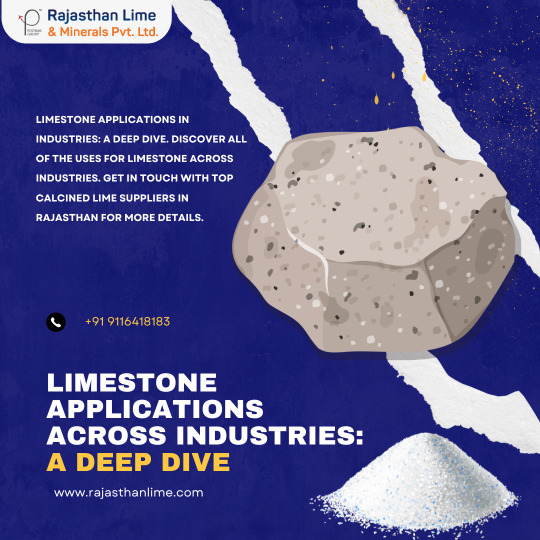
Limestone, an essential sedimentary rock, plays an integral part in numerous industries due to its multifarious applications. From construction and agriculture, manufacturing, environmental remediation and even aesthetic uses - limestone plays a pivotal role in modern society. We will examine all of its various uses within industries by exploring calcined lime, hydrated lime and quicklime and their Calcined Lime Suppliers Rajasthan.
Understanding Limestone and Its Forms:
Limestone, composed primarily of calcium carbonate, can be found in quarries and mines in many regions worldwide - Rajasthan in India is particularly well-known for its abundant deposits of limestone rock. Once extracted from quarries or mines, various processes transform this mineral into various forms including calcined lime, hydrated lime, quick lime or quicklime for use across numerous industries.
Construction Industry:
Limestone plays an integral part in the production of cement and concrete in construction projects, while being heated at high temperatures produces calcined lime that forms an essential ingredient of both processes hydrated lime manufacturer in rajasthan, created through hydration of calcined lime, improves workability and durability of concrete mixtures making it indispensable in projects of all kinds.
Agriculture Sector:
Limestone plays a central role in agriculture, acting as a soil amendment to neutralize acidic soils and enhance crop productivity. Hydrated lime is frequently applied to acidic soils to increase pH levels and boost soil fertility; farmers in Rajasthan rely heavily on local hydrated lime manufacturers for quality agricultural lime products for cultivation purposes.
Manufacturing Industries: Limestone serves as an indispensable raw material in many manufacturing industries, from steel fabrication and paper production to glassmaking and chemical creation. Quick lime manufacturers in Rajasthan supply high-grade quick lime products tailored to specific manufacturing processes.
Environmental Remediation:
Limestone's alkaline properties make it a powerful agent for environmental remediation. Hydrated lime is widely employed at wastewater treatment plants to neutralize acidic effluents and filter impurities out, while limestone-based products are frequently employed as part of flue gas desulfurization systems to mitigate sulfur dioxide emissions from industrial sources - ultimately contributing to efforts at improving air quality improvement efforts.
Suppliers and Manufacturers in Rajasthan:
Rajasthan, famed for its abundant limestone reserves, boasts many suppliers and manufacturers that supply calcined lime, hydrated lime, quick lime and other forms of quicklime products to meet demand from cement and steel industries. Calcined lime suppliers in Rajasthan specialize in offering high-grade lime products tailored specifically for use by these industries while hydrated lime manufacturers supply agricultural lime for soil conditioning applications as well as industrial lime products to various industrial processes in Rajasthan. Finally quick lime manufacturers ensure consistent supply to various manufacturing processes throughout their region.
Conclusion:
Limestone plays an essential role across industries and serves as the cornerstone of modern civilization. From construction and agriculture to manufacturing and environmental remediation, its versatility and utility are unparalleled. As quick lime manufacturers in rajasthan and manufacturers continue meeting demand for calcined lime, hydrated lime, quick lime etc. calcined lime's legacy of application in multiple industries will remain intact, helping shape their growth while contributing to sustainability efforts in various forms of industry development.
#Calcined Lime Suppliers Rajasthan#hydrated lime manufacturer in rajasthan#quick lime manufacturers in rajasthan
0 notes
Text
Fluxing Magic: Lime’s Impact on Slag Formation in Copper Smelting
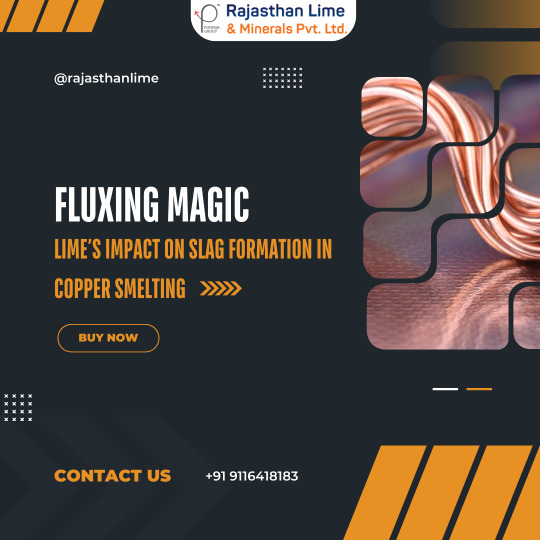
Lime is an integral element in copper smelting, directly contributing to slag formation. This article delves into this fascinating relationship and investigates its profound effects on efficiency and quality in this critical industrial process.
Understanding Slag Formation
Lime plays an essential part of copper smelting, where its creation forms an essential aspect. Molten copper undergoes the smelting process in which impurities are extracted and removed in order to produce purified copper products. Lime is strategically added during this step in order to react with acidic impurities like silica (SiO2) to form stable compounds known as slag that float on top of molten copper for removal purposes.
Lime and Slag Formation
Lime (calcium oxide, CaO) serves an integral function in copper smelting as a flux agent, reacting with silica impurities present in molten copper to neutralize and promote its formation into slag. This chemical reaction leads to calcium silicate (CaSiO3) production that aids effective impurity separation processes.
Acidic Impurity Neutralization: Lime is an excellent way of neutralizing acidic impurities like silica, creating stable slag compounds which are easy to separate from the molten copper.
Lime Enhances Copper Recovery: By aiding efficient slag formation, lime can improve copper recovery rates during the smelting process.
Lime's addition helps regulate heat management within the smelting furnace, providing ideal temperatures for efficient copper extraction and impurity removal. Benefits of Lime in Copper Smelting mes Utilizing Copper industry lime products india smelting offers several distinct advantages:
Lime promotes faster and more thorough removal of impurities from molten copper, leading to improved process efficiency and productivity. Reduced Energy Consumption: Lime helps optimize smelting conditions to reduce energy use and operational costs while improving process efficiencies and productivity.
Environment Sustainability: Lime-based slag formation can reduce waste generation and the environmental impact of copper smelting through cleaner, more efficient processes.
Importance of Quality Lime Supply
For optimal copper smelting results, obtaining top-quality lime from reliable suppliers is crucial to achieve optimal results. High-grade lime ensures uniform chemical composition and purity levels to provide reliable performance throughout the smelting process.
Conclusion
Lime's role in slag formation is integral to copper smelting, impacting efficiency, energy use and environmental sustainability. By taking advantage of lime's fluxing properties to optimize operations and foster sustainable growth and innovation.
Reputable lime manufacturers in Jodhpur, Rajasthan play an invaluable role in providing high-quality lime products that meet the stringent requirements of the Copper mining lime solutions Rajasthan industry.
#Copper mining lime solutions Rajasthan#Best lime manufacturers for copper in Jodhpur#Copper industry lime products india
0 notes
Text
Steel Industry and Climate Change: Carbon Reduction Initiatives
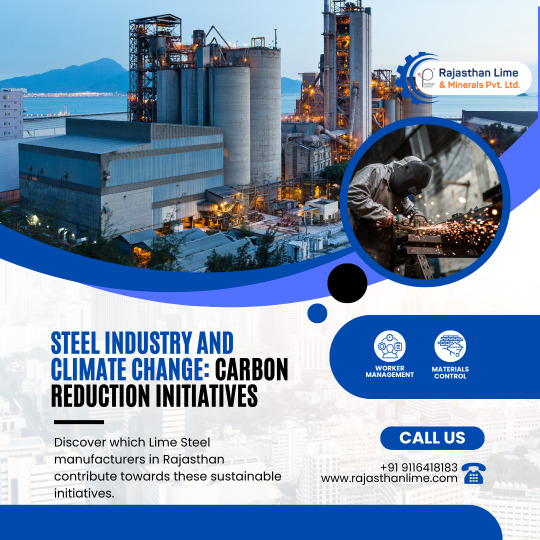
Steel production is an industry that generates significant carbon emissions globally. The process entails multiple steps, each contributing to the release of CO2 into the atmosphere. Primary sources of emissions associated with best lime steel manufacturers in India include:
Iron Ore Smelting: Iron ore is transformed into liquid iron by blast furnaces at high temperatures using coal or coke as fuel, leading to combustion that emits CO2, contributing to greenhouse gas emissions and contributing to greenhouse warming.
Electric Arc Furnaces: Scrap steel is melted using electricity generated from fossil fuel-fueled grids in electric arc furnaces. Although this method emits less CO2 directly compared to blast furnaces, its indirect emissions remain substantial.
Chemical Reactions in Steelmaking: Steel production involves chemical reactions that release CO2, such as the reduction of iron oxide and formation of alloy steels, that generate CO2. Reducing emissions within this sector poses various challenges; here are just a few:
Technological Constraints: Traditional blast furnace technology has long been established and challenging to replace with low-carbon alternatives. Innovations such as hydrogen-based steelmaking are promising but require significant research and development investments.
Cost and Investment: Transitioning to low-carbon technologies often requires making significant investments in new infrastructure and processes that may prove too costly for some companies to implement.
Market Demand: Global steel consumption continues to increase, creating an ongoing challenge of simultaneously reducing emissions while fulfilling market needs. Addressing these difficulties requires creative solutions and collaborative efforts within the industry.
Lime's Crucial Role in Carbon Reduction
Calcium oxide (CaO), also known as lime, plays a pivotal role in helping steel producers reduce carbon emissions through steel production: it contributes significantly to this reduction.
Ore Refinement: Lime is used in the refinement of iron ore to remove impurities such as silica, alumina and phosphorus which reduce furnace efficiency while cutting energy consumption during smelting. This significantly enhances furnace efficiency while simultaneously cutting back on costs associated with energy consumption during smelting processes.
Desulfurization: Lime is an excellent solution for controlling sulfur dioxide (SO2) emissions produced during steelmaking. Not only does this meet environmental regulations but it also contributes to cleaner air quality.
CO2 Capture: Lime-based technologies can effectively capture carbon emissions from steel plants through mineral carbonation or direct air capture methods, helping the industry reduce its carbon footprint significantly. best lime steel manufacturers in rajasthan.
Rajasthan is home to several lime manufacturers who are widely-recognized for their commitment to sustainability and innovation in steel production:
State-of-the-Art Facilities: Leading lime manufacturers in Rajasthan invest in state-of-the-art facilities equipped with cutting edge technologies for producing lime.
Quality Control: Manufacturers employ stringent quality control measures to guarantee the purity and consistency of lime products used in steelmaking.
Research and Development: Lime manufacturers employing cutting-edge approaches and ongoing research efforts can create eco-friendly lime formulations to meet the varying demands of the steel industry.
Conclusion
The steel industry's efforts to address climate change through carbon reduction initiatives are essential to global sustainability. Lime-based solutions offer a promising pathway toward decarbonization, helping steelmakers reach their sustainability goals while still remaining cost-competitive in the market.
Cooperation between steelmakers and lime manufacturers will be essential in creating meaningful change toward a greener future. Lime's multifaceted role in carbon reduction within the steel industry highlights the significance of sustainable practices and innovation for meeting environmental goals.
#best lime steel manufacturers in jodhpur#best lime steel manufacturers in rajasthan#best lime steel manufacturers in India
0 notes
Text
Hydrated Lime: Essential Ingredient in Water Treatment Processes
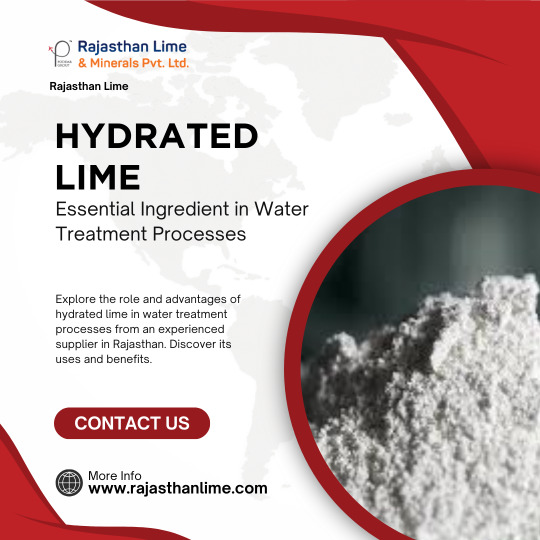
Introduction of Hydrated Lime in Water Treatment
Hydrated lime (Ca(OH)2) is an indispensable water treatment agent, widely employed across industries for various water quality challenges. Hydrating quicklime (calcium oxide) with water results in this versatile compound which offers several advantages in terms of treating wastewater. hydrated lime manufacturers in india importance lies in its ability to address various challenges effectively while its production creates benefits across a range of water treatment processes.
Hydrated lime plays an essential role in water treatment as an essential pH regulator, helping to stabilize and adjust acidity or alkalinity of water, creating ideal conditions for subsequent processes. By neutralizing acidic wastewater, hydrated lime helps protect pipes and equipment against corrosion while increasing overall treatment efficiency. Furthermore, its inclusion as part of coagulation/flocculation processes ensures removal of suspended particles through increased aggregation that ultimately facilitates their separation through filtration.
Understanding Hydrated Lime's Role
Hydrated lime's role in water treatment is multifaceted; not only can it adjust pH levels, it can also facilitate impurity removal through precipitation and coagulation. When added to water, hydrated lime reacts with heavy metals, sulfates, and phosphates in solution to form insoluble precipitates that can easily be filtered out; this property makes hydrated lime particularly valuable when treating industrial wastewater as removal of pollutants is critical for regulatory compliance and environmental protection.
Hydrated Lime Applications in Water treatment.
pH Adjustment: Hydrated lime can be used to neutralize acidic wastewater by raising its pH level and thus prevent corrosion on pipes and equipment, increasing longevity and efficiency in treatment systems.
Coagulation and Flocculation: Hydrated lime can assist water treatment by aiding the coagulation and flocculation processes. hydrated lime manufacturers in jodhpur helps form flocs which can easily be removed by filtering or sedimentation systems.
Water Softening: Hydrated lime can be an effective water softening agent. It reacts with calcium and magnesium ions that contribute to hard water by reacting with them and creating insoluble precipitates that are easily removable through filtration.
Hydrated lime enhances disinfection processes by adjusting pH levels and clearing away organic material which could interfere with chlorine disinfectants, making for more effective disinfection processes. Benefits of Hydrated Lime in Water Treatment.
Hydrated lime offers several advantages when treating water:
Cost-Effectiveness: Hydrated lime offers an economical solution for pH adjustment and precipitating contaminants in water treatment, unlike many of its alternatives.
Versatility: UV technology can be applied across different treatment processes, making it an ideal solution for water treatment facilities facing various water quality issues.
Hydrated lime is environmentally-friendly as it helps remove pollutants and heavy metals from water sources, contributing to cleaner water and environmental protection.
Utilizing Hydrated Lime Manufacturers in Rajasthan.
Rajasthan is home to several highly reputable manufacturers that specialize in producing top-quality hydrated lime for water treatment applications, using advanced production techniques and adhering to stringent quality standards to guarantee its purity and efficacy. By purchasing their hydrated lime from trusted vendors in Rajasthan, water treatment facilities can optimize their processes while simultaneously meeting regulatory requirements more effectively.
Conclusion:
Hydrated lime has become an indispensable ingredient of modern water treatment processes, providing crucial pH adjustments, aiding coagulation processes and filtering out impurities from our water supply. Partnering with reliable hydrated lime manufacturers in jodhpur is crucial to ensure efficient and sustainable operations within water treatment facilities in Rajasthan and elsewhere - taking advantage of its benefits to promote environmental sustainability and public health through provision of high-quality treated water to communities across hydrated lime manufacturer in rajasthan,and beyond.
#hydrated lime manufacturer in rajasthan#hydrated lime manufacturers in jodhpur#hydrated lime manufacturers in india
0 notes
Text
Lime-Based Desulfurization in Steelmaking: Process and Benefits

Lime-based desulfurization in the steel industry is an integral component of high quality production and environmental compliance. This technique utilizes lime to remove sulfur impurities from molten steel, improving mechanical properties while decreasing emissions.
Desulfurization in Steelmaking
Desulfurization is essential in steelmaking to reduce sulfur levels that could negatively impact its properties and performance, with lime being one of the key components in this process as it interacts with sulfur to form calcium sulfide (CaS), allowing it to be easily extracted from the steel product.
Lime's Role in Desulfurization
Lime (calcium oxide or CaO) plays a critical role in desulfurization by reacting with sulfur to form calcium sulfide (CaS). This reaction effectively removes sulfur from molten steel, leading to improved quality and bettering steel quality.
Desulfurization involves adding lime to a steel ladle or furnace where it reacts with sulfur present in molten steel, creating calcium sulfide which combines with other impurities to form a floating layer that efficiently removes sulfur.
Steps Involved In Desulfurization
Desulfurization typically entails several key steps:
Lime Injection: Lime is introduced into a steel ladle or furnace as an additive.
Sulfur Removal Reaction: Lime reacts with sulfur to form calcium sulfide which in turn combines with impurities to form slag.
Slag Removal: Slag layer is scraped from the surface of molten steel to extract sulfur and other impurities.
Benefits of Lime-Based Desulfurization
Lime-based desulfurization has several key advantages over other forms of desulfurization techniques:
Improved Steel Quality: Lower sulfur content improves steel properties like ductility, toughness, and weldability. Environmental Compliance: Desulfurization reduces emissions of sulfur dioxide (SO2) emissions for improved air quality and sustainability in the environment.
Lime-based desulfurization offers cost-effectiveness when compared to other desulfurization processes, and can be utilized across various steelmaking processes such as Basic Oxygen Furnaces (BOFs) and Electric Arc Furnaces (EAFs), providing flexibility to steelmakers.
Top Lime Manufacturers in Rajasthan Rajasthan's premier lime manufacturers specialize in producing high-grade lime for use in steelmaking applications. Their best lime steel manufacturers in jodhpur processes help improve efficiency and sustainability for India's steel production process.
Conclusion
Lime-based desulfurization is a vital process that improves steel quality while decreasing environmental impact and increasing overall efficiency in steelmaking operations. top lime manufacturers for steel industry in Rajasthan play an integral part in providing top quality lime to support India's steel industries with technical knowledge and innovative solutions; driving forward steel production across India.
#top lime manufacturers for steel industry in Rajasthan#best lime steel manufacturers in jodhpur#best lime steel manufacturers in rajasthan
0 notes
Text
How Lime Enhances Paper Quality and Strength

Introduction to Lime in Paper Processing
Lime is an essential component in paper processing, contributing significantly to quality and strength. Lime is particularly essential during alkaline pulping processes such as the Kraft process where it helps break down lignin and other impurities found in wood fibers; creating an alkaline environment helps facilitate efficient fiber separation while producing stronger pulp.
Alkaline Pulping Process and Lime's Role
Kraft pulping relies heavily on alkaline lime pulping as an alkalinity-extraction method for extracting lignin from wood fibers. Lime reacts with the lignin to separate it from cellulose fibers - an integral process in producing high-quality pulp that stands the test of time and makes for further paper processing operations. Lime's role ensures kraft pulp is strong, bright, and suitable for further transformation into Lime in paper processing Rajasthan.
Bleaching and Brightness Improvement with Lime
Lime is an indispensable element of bleaching processes that aim to achieve desired brightness and whiteness in paper products. As an alkaline agent, lime helps remove impurities such as impurity-causing residual lignin residue, leading to improved paper brightness. By controlling pH levels during bleaching sessions, lime helps enhance the effectiveness of chemicals like chlorine dioxide or hydrogen peroxide bleaching solutions.
Neutralizing Acidic Compounds in Paper Processing
At various stages of paper production, acidic compounds may form, endangering its quality and lifespan. Lime is essential in neutralizing these acidic compounds by stabilizing pH levels and preventing degradation to paper properties; neutralizing acids with lime helps preserve its integrity for extended durability of the finished product.
Enhancing Paper Strength and Durability
Its Lime has an unparalleled impact on paper strength and durability. By changing its fiber structure, lime promotes fiber bonding to strengthen overall paper strength - giving paper greater ability to withstand physical strain during printing, handling, transport and use; contributing significantly to longevity and usability.
Lime's Role in Waste Treatment at Paper Mills
Lime is widely utilized at paper mills as a wastewater treatment agent. The alkaline properties of lime help remove impurities and contaminants from wastewater streams while controlling pH levels to comply with environmental regulations while mitigating its environmental impact.
Lime Products and Suppliers in Jodhpur's Paper Industry
Lime products play a pivotal role in Jodhpur, an industrial center, in supporting its paper industry. Reputable Paper industry lime products in Jodhpur offer tailored lime solutions tailored specifically for paper manufacturers based on industry standards to meet performance benchmarks for optimal paper processing results.
Lime Suppliers in Rajasthan and Across India
Rajasthan and other regions in India feature an expansive network of lime suppliers who serve the paper industry and other sectors, including quicklime, hydrated lime and derivative products such as lime derivatives. These suppliers play an invaluable role in supporting India's paper industry by guaranteeing an ample supply of lime products for various uses.
Conclusion
Lime is an integral component of paper processing, contributing significantly to paper quality, strength, and environmental sustainability. From alkaline pulping processes to waste treatment solutions, lime is indispensable in supporting paper industry growth and sustainability efforts. Reputable Paper industry lime suppliers in India and India make lime products available that play a part in supporting growth efforts within this sector.
#Paper industry lime products in Jodhpur#Lime in paper processing Rajasthan#Paper industry lime suppliers in India
0 notes
Text
Industrial Uses of Bulk Lime in India

Introduction:
Bulk lime plays a crucial role in various industries across India, serving as a versatile material with diverse applications. Let's explore the industrial uses of Lime delivery in bulk Jodhpur and its significance in different sectors.
1. Steel Industry:
LIME IS INVALUABLE In India's steelmaking processes, bulk lime is essential. It plays an essential role in desulfurization - when lime reacts with sulfur to form calcium sulfide that can then be extracted as slang for removal - dephosphorization by producing calcium phosphate slag - as well as fluxing impurities out of molten steel during refining; eventually resulting in high-quality steel with improved mechanical properties being created.
2. Water Treatment:
At water treatment plants, bulk lime is often employed for pH adjustment and coagulation - neutralizing acidity while precipitating heavy metals, suspended solids, and phosphates from water bodies. Lime softening also plays a key role by precipitating calcium and magnesium ions into solution and softening hard water bodies. Ultimately this increases efficiency with other forms of treatment like filtration and disinfection methods.
3. Construction:
Bulk lime has many applications in construction. It is commonly used in mortar and plaster formulations to increase workability, durability, setting time of building materials, bonding to bricks and stones more securely than their concrete counterparts while simultaneously offering exceptional water retention properties that reduce cracking while prolonging structural longevity.
4. Agriculture: In agriculture,
bulk lime application helps neutralize acidity and improve soil structure by increasing pH levels, making essential nutrients more readily accessible to plants, while providing calcium and magnesium that contributes to plant health. Lime also enhances microbial activity while decreasing aluminum toxicity levels while mitigating soil erosion - all key factors for healthier and more productive crops.
5. Sugar Industry:
Bulk lime plays a pivotal role in sugar refining in India. It's used for pH adjustments when clarifying sugar cane juice to remove proteins and non-sugar impurities resulting in clearer juice; additionally it aids sucrose crystallization processes by controlling pH levels for efficient sugar crystal growth and refining processes.
6. Paper Industry:
Bulk lime is widely utilized by the paper industry for pulp bleaching and pH regulation. Lime helps remove impurities such as lignin from fibers during bleaching processes while also maintaining alkalinity of pulp to maximize effectiveness of bleaching agents such as chlorine dioxide or hydrogen peroxide - leading to brighter, whiter, stronger paper products.
7. Mining and Metallurgy:
Lime is widely utilized in mining and metallurgical operations to process ore and treat wastewater generated during metal extraction, helping separate valuable minerals from gangue by adjusting pH levels in flotation processes and neutralizing acid mine drainage, while treating wastewater generated during metal extraction to minimize environmental impact and ensure regulatory compliance.
8. Environmental Remediation:
Lime plays an essential role in environmental remediation projects across India. It helps neutralize acidic soils and stabilize polluted sites while simultaneously increasing soil fertility and encouraging revegetation in areas affected by acid mine drainage, industrial pollution or hazardous waste disposal.
9. Chemical Industry:
At its core, the chemical industry uses bulk lime as a vital raw material in its various chemical processes. Lime is vital for manufacturing calcium-based chemicals like calcium hydroxide, calcium chloride and calcium carbonate as well as being utilized as an alkaline catalyst in organic synthesis reactions.
10. Pharmaceuticals:
Bulk lime can be utilized in pharmaceutical production for producing medications and supplements. This may involve producing calcium carbonate tablets to combat stomach acidity or acting as an antacid; additionally it's employed as an excipient or pH adjuster in formulations used by pharmaceutical manufacturers.
Conclusion:
India's industrial uses for bulk lime are extensive and essential across a range of sectors. From steelmaking to water treatment, agriculture and construction projects - Bulk lime supply services in India plays a pivotal role in improving processes while guaranteeing product quality - its versatility making it an invaluable asset for sustainable industrial development in India.
#Lime delivery in bulk Jodhpur#Bulk lime supply services in India#bulk lime supply services in India
0 notes
Text
Steel Supply Chain Management: Challenges and Best Practices

The steel industry operates within complex supply chains that must be effectively managed to ensure seamless production, distribution and delivery of steel products. From raw materials to finished goods, successful supply chain management is vital for optimizing operations and meeting customer demands. In this article we explore some of the challenges encountered by steel supply chain management as well as best practices that may improve its efficiencies.
Management Challenges of Steel Supply Chain
1. Raw Material Acquisition Steel production
relies on various raw materials, such as iron ore, coal and alloys. However, maintaining an affordable supply can be challenging due to fluctuating prices, geopolitical risks and transportation constraints partner with the best lime steel manufacturers in jodhpur .
2. Production Planning For efficient steel manufacturing,
matching production capacity with demand forecasts is paramount. However, unexpected disruptions such as equipment failure or labor shortages may wreak havoc with production schedules, leading to inefficiency.
3. Inventory Management Maintaining
optimal inventory levels in the steel industry is of utmost importance in order to avoid stockouts and minimize carrying costs. Inadequate management could lead to excess or obsolete inventories tying up capital and warehouse space.
4. Transportation and Logistics
Due to their size and weight, steel products often require special handling during their delivery process. Finding reliable logistics partners and optimizing transportation routes are two major hurdles within the steel supply chain.
5. Quality Control and Compliance
Ensuring product quality and compliance with industry standards throughout the supply chain are critical to customer satisfaction and regulatory compliance, whereas any inadequacies in quality control measures could result in product defects and recalls that could harm both customer relationships as well as regulatory enforcement efforts.
1. Strategic Partnerships
To improve supply chain visibility and responsiveness, build strategic relationships with dependable suppliers and logistics providers to form collaborative relationships for enhanced supply chain visibility and responsiveness. Cooperative relationships may allow for improved negotiation terms as well as faster issue resolution.
2. Digital Transformation
Implementing cutting-edge technologies like IoT sensors, predictive analytics, and blockchain can enhance supply chain transparency and real-time monitoring enabling proactive decision-making and risk management.
3. Lean Manufacturing
Whilst lean principles aim to streamline production processes and eliminate waste, continuous improvement methodologies such as Six Sigma and Kaizen can optimize resource usage while increasing productivity.
4. Inventory Optimization
Make the most out of inventory optimization tools to accurately anticipate demand and maintain optimal stock levels. Implement just-in-time (JIT) inventory practices to lower carrying costs and enhance cash flow.
5. Risk Mitigation Strategies
Develop contingency plans for potential supply chain disruptions such as supplier failure or natural disaster. Diversify sourcing options and increase resilience through sound risk mitigation strategies.
Conclusion
Effective supply chain management is vital to the success of top lime manufacturers for steel industry in Rajasthan operations. By addressing challenges and implementing best practices, steel companies can increase operational efficiency, lower costs and deliver superior products to customers. Attracting innovation while forging collaborative partnerships is key to building resilient supply chains within this dynamic industry.
#top lime manufacturers for steel industry in Rajasthan#best lime steel manufacturers in jodhpur#best lime steel manufacturers in rajasthan
0 notes
Text
Limestone Mining Practices: Balancing Industry and Ecology

Limestone mining is an essential industry that provides the raw materials needed by various industries that include steel production agriculture, construction, and water treatment. However the extraction and processing of limestone should be conducted with a careful eye on its impact on the environment in order to guarantee sustainability and balance for the environment.
Importance of Limestone in Industrial Applications
Limestone, which is primarily made up of calcium carbonate (CaCO3) , is an essential resource in many industrial processes. Quick lime manufacturers in India which are derived from limestone are crucial in the production of steel as well as in water treatment as well as soil stabilization. Limestone can also be used as a building material as well as in the manufacture of chemicals.
Mining Techniques and Challenges
Limestone mining covers a variety of extraction techniques that are adapted to the geological properties of deposits. Surface mining, which includes open-pit mining and quarrying, is typical for deposits with shallow depths but underground mining is employed to extract deeper reserves. The challenges in limestone mining are destruction of habitats, land degradation and water pollution resulting from the runoff of sediment along with chemical leaching.
Environmental Impact Mitigation
Responsible limestone mining requires the effective reduction of environmental effects. Methods like an effective land reclamation process post-mining as well as dust suppression strategies and water management techniques are vital in order to stop the degradation. Utilizing modern equipment and techniques can help reduce noise and dust pollution and improve sustainability.
Sustainable Mining Practices
Leading limestone producers in Rajasthan focus on sustainability as a key element in their business. They conduct extensive environmental impact studies prior to mining, develop robust reclamation strategies, and are involved in efforts to conserve biodiversity. Modern technology helps minimize environmental impacts and maximizes the utilization of resources.
Regulatory Compliance and Monitoring
Mining operations for limestone in India are regulated by strict guidelines for environmental protection and the use of land. Monitoring of water and air quality as well as biodiversity assessments are conducted to monitor and reduce negative impacts. Conformity to regulations assures the use of responsible mining methods.
Community Engagement and Benefits
Companies that are responsible for their limestone mines collaborate with the local community to solve issues and create mutually beneficial relationships. Community-based initiatives, including education and infrastructure projects aid in improving the lives of people and foster positive relationships.
Conclusion
In conclusion, the mining of limestone is essential for industrial processes, but it requires careful oversight to minimize environmental impacts. The top calcined lime dealers jodhpur insist on environmental stewardship, and adhere to strict standards to ensure that industrial requirements are balanced with the preservation of the environment. Responsible mining practices are crucial to sustainably utilizing the natural resource that is so valuable.
0 notes
Text
Limestone Wonders: Unveiling Geological Marvels
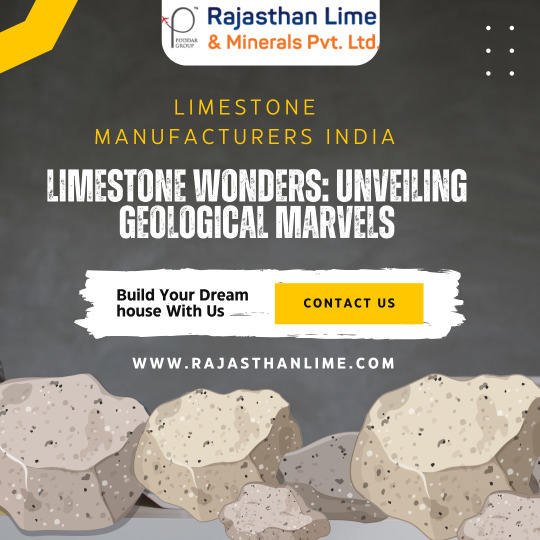
Limestone is an incredible geological marvel, playing an indispensable role in various industries and landscapes worldwide. From its formation to its application, limestone showcases both geological wonders and human innovation.
Formation of Limestone
Limestone formation is an incredible process driven by marine organisms like coral, algae, and shellfish producing calcium carbonate (CaCO3) over millennia, depositing these shells on the ocean floor where they gradually compact over geological processes into rock solid limestone formations like this one. This incredible event illustrates nature's transformative power as organic materials contribute to creating long-lived geological formations like limestone partner with best limestone manufacturers india.
Limestone displays stunning geological features, from rugged cliffs to intricate cave systems. There are various types of limestone. These include:
Geological Features and Types
Chalk is a soft and porous limestone composed of marine organisms found on microscopic marine organisms,
while Travertine comes from mineral deposits in groundwater and forms unique patterns. Marble, on the other hand, has metamorphosed limestone structures and is highly prized for its beauty. These three rocks all make up what are commonly referred to as sedimentary rocks with various industrial applications.
Industrial Applications
Construction: Limestone is used extensively in building materials like cement, concrete and aggregates due to its durability and versatility. Manufacturing: Steel mills use limestone in blast furnaces as a purging agent in order to produce molten iron.
Environmental Remediation: Limestone can neutralize acidic soils and waters, helping create healthier ecosystems.
Water Treatment: Calcined limestone (quicklime) can be used to purify water by adjusting pH levels and filtering out impurities from it.
Limestone Suppliers in India Its India boasts a rich heritage of limestone mining and production, boasting several notable manufacturers and suppliers that meet diverse industrial needs. Rajasthan stands out as a hub for limestone production and distribution with numerous reliable suppliers serving both domestic and global markets.
Lime Suppliers in Rajasthan
Lime suppliers play an essential role in providing steel, paper, agriculture and construction industries with quality lime products from Rajasthan's lime industry. Rajasthan stands out as an innovator when it comes to sustainability solutions for limestone processing; top lime suppliers in Rajasthan use advanced technologies and sustainable practices to meet diverse customer demands across industries.
Lime suppliers provide an expansive selection of products tailored specifically to specific industry requirements, such as calcined lime powder, hydrated lime and limestone aggregates. Calcined lime powder plays an integral part in steel production by helping remove impurities from fluxing processes while hydratated lime is widely utilized in water treatment facilities, agriculture and construction for pH adjustments, soil stabilization and mortar production. Limestone aggregates play an integral part in road base material creation and concrete production.
Lime industry in Rajasthan plays an instrumental part in driving economic development and industrial progress. lime supplier in rajasthan prioritize quality, sustainability and innovation to contribute to the success and efficiency of various sectors that rely on lime products.
Environmental Importance
Limestone can bring several environmental advantages. It acts as a carbon sink, absorbing CO2 from the atmosphere through weathering processes and mitigating climate change impacts. Limestone landscapes also host unique biodiversity with specialized flora and fauna found only there.
Conclusion
Limestone is more than a rock; it's an artistic tribute to Earth's history and human imagination. From majestic landscapes to essential industrial applications, limestone inspires wonder and innovation. As demand for sustainable materials rises, limestone remains an indispensable element in modern civilization supplied by reliable limestone manufacturers india and beyond.
0 notes
Text
Calcined Lime Powder: Essential Ingredient in Water Treatment Processes
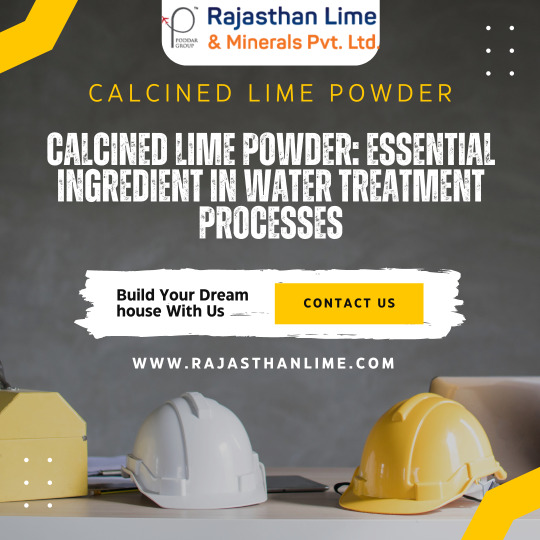
Calcined Lime Powder
Calcined lime powder, commonly referred to as quicklime or burnt lime, plays an integral part in water treatment processes due to its versatile chemical properties and application options. In this article we explore its significance across various water treatment applications in Rajasthan and Jodhpur while outlining its advantages as well as calcined lime powder manufacturers in rajasthan in these regions.
Calcined Lime Powder in Water Treatment
Calcined lime powder is widely utilized in water treatment to control pH levels, remove impurities, and facilitate coagulation. When added to water, quicklime reacts exothermically with molecules of water molecules to form calcium hydroxide; an extremely strong base that neutralizes acidity while also acting to precipitate impurities from suspension in suspension.
Key Applications of Calcined Lime Powder in Water treatment systems
Adjustment: Calcined lime powder can be used to raise the pH in acidic waters, creating optimal conditions for subsequent treatment processes like coagulation and flocculation.
Coagulation: Lime can aid in the creation of insoluble hydroxides that facilitate the removal of suspended particles and contaminants from water, including lime used to soften its hardness-causing calcium and magnesium ions. For Softening, lime is often employed by its manufacturers as part of an anti-hardness solution.
Lime is used to precipitate metals from wastewater, making them easier to separate and remove.
Benefits of Calcined Lime in Water Treatment
Effective pH regulation and stabilization, improved coagulation and sedimentation for efficient particle removal, reduction of water hardness through calcium and magnesium removal and enhanced removal of impurities, organic matter, and contaminants are among the many features offered by water purification systems.
Comparison between alternative treatment methods and cost-effectiveness
Rajasthan is home to numerous manufacturers that specialize in producing premium calcined lime powder for water treatment applications, adhering to stringent quality standards in providing reliable products to meet the diverse requirements of water treatment plants.
Jodhpur offers numerous reputable Calcined Lime Suppliers Jodhpur offering comprehensive solutions to water treatment plants. These vendors ensure timely delivery, technical support, and customized solutions tailored to address specific water treatment requirements.
Top Calcined Lime Dealers in India
India boasts numerous dealers that specialize in providing calcined lime for various industrial uses, including water treatment. These dealers source lime from reliable manufacturers, playing an essential role in guaranteeing its availability and quality for water treatment processes.
Conclusion:
Calcined lime powder has become an integral component of modern water treatment processes, contributing significantly to purifying and sustainably using our resources. Top Calcined Lime Dealers India - particularly Jodhpur - play an instrumental role in providing ample, quality calcined lime powder products for such uses.
#calcined lime powder manufacturers in rajasthan#Calcined Lime Suppliers Jodhpur#Top Calcined Lime Dealers India
0 notes
Text
Environmental Impact of Lime Usage in Steel Production
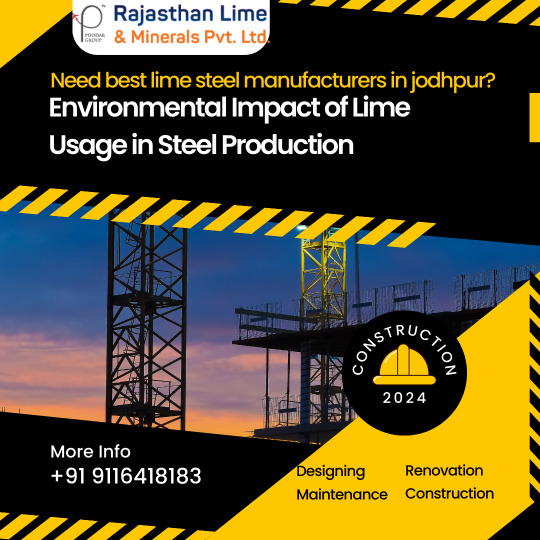
Lime is an integral component of steel production, contributing to both operational efficiency and environmental sustainability. In this article, we examine its environmental impact as part of steel production while discussing both benefits and challenges derived from using it partner with Best lime steel manufacturers in rajasthan
.
Lime's Role in Steel Production Lime,
such as calcium oxide or calcium hydroxide (CaO/Ca(OH)2) is widely utilized throughout steelmaking processes and serves multiple functions, including desulfurization, slag formation and pH regulation during refining processes. Furthermore, lime helps remove impurities from raw materials while simultaneously improving final steel product quality.
Reduce Environmental Impact Through Desulfurization
Lime usage in steel production offers several environmental advantages, one being desulfurization. Lime reacts with sulfur and other impurities during steelmaking to form slag that can easily be separated from molten metal, significantly decreasing emissions while improving air quality around steel plants.
Lime is also an integral component in reducing carbon emissions in steel production, by helping remove silicates and phosphorus from iron ore and improving carbon utilization efficiency in blast furnaces. Furthermore, lime-based fluxes play an integral part in producing slag which captures carbon emissions thereby decreasing greenhouse gas emissions.
Lime-based wastewater treatments in steel production help raise pH levels in wastewater, decreasing acidity and keeping harmful contaminants out of our bodies - contributing to enhanced water quality and environmental protection.
Challenges and Solutions
While lime use in steel production offers environmental advantages, its use also presents challenges, including high energy usage and carbon dioxide emissions during its production. Innovations such as carbon capture and utilization technologies may help mitigate such challenges to increase its sustainability and ensure its continued usage in processes using lime as part of their processes.
Role of Steel Manufacturers in Sustainability
The best lime steel manufacturers in Jodhpur and Rajasthan that prioritize sustainability take steps such as adopting energy-saving practices, investing in green technologies and optimizing lime usage to minimize environmental impacts. Such initiatives contribute to sustainable steel production as well as conservation initiatives.
Conclusion
Lime is an integral component of steel production, offering numerous environmental advantages through desulfurization, carbon emission reduction and water quality enhancement. Although challenges remain for steel manufacturers when it comes to sustainability measures, ongoing efforts by them to advance sustainability demonstrate their dedication towards environmental responsibility and showcase that by harnessing lime's potential and adopting green practices they are contributing to creating a cleaner and greener future.
0 notes
Text
Understanding the Chemical Composition of Indian Limestone

Chemical Composition of Indian Limestone
Indian limestone exhibits an array of chemical compositions, with calcium carbonate (CaCO3) constituting its main constituent along with other minerals and impurities in variable proportions; this composition may differ based on geological factors, location and the type of limestone deposit; impurities typically found include:
Magnesium Carbonate (MgCO3): Magnesium carbonate can often be found in dolomitic limestone, which contains both calcium carbonate and magnesium carbonate. Dolomitic limestone can be used in agriculture as well as magnesium production partner with best Lime Manufacturers in jodhpur.
Silica (SiO2): Silica is an impurity found in limestone that can alter its hardness and suitability for various uses.
Iron Oxide (Fe2O3): Used to add coloration and enhance quality and purity in limestone products, iron oxide can add its signature hues.
Alumina (Al2O3): Another impurity which may alter limestone properties is Alumina, particularly during industrial processes.
Industrial Applications of Indian Limestone
Cement Manufacturing: Limestone is an essential ingredient in cement production, providing calcium to produce clinker that is ground down into cement. The chemical composition of Indian limestone can determine its suitability for specific cement formulations.
Limestone is widely utilized as a flux in steelmaking processes to remove impurities and adjust viscosity of slag, as well as aid in its formation which captures impurities for efficient steel production.
Chemical Industry: Limestone is used extensively in the production of various chemicals, such as calcium carbide, sodium carbonate (soda ash), and lime (calcium oxide). The composition of limestone plays an integral part in chemical reactions; therefore its effectiveness largely determines this use.
Construction: Crushed limestone aggregate is used in concrete and road construction as an aggregate, contributing to its strength and durability of concrete mixtures. Its chemical makeup influences these properties.
Indian Limestone's Key Components Calcium Carbonate (CaCO3): This key constituent of limestone contributes its alkaline properties and chemical reactivity. Calcium carbonate purity directly affects the quality of lime-derived products such as cement.
Physical Properties: Limestone's mineral content also influences physical properties like hardness, porosity and color; these attributes determine its suitability for specific industrial uses.
Benefits of Indian Limestone
Abundance: India boasts abundant reserves of limestone spread across various states, providing industries with reliable supplies while decreasing dependence on imports.
Cost-Effective: Locally-sourced limestone can be more cost-effective due to reduced transportation expenses, making it an appealing solution for industries needing large quantities of limestone.
Versatility: Indian limestone finds wide application in various industries due to its versatility. It can be tailored specifically for individual manufacturing processes, making it essential in various manufacturing processes.
Importance of Quality Control
Lime Manufacturers in Rajasthan emphasize quality control measures to guarantee consistency and purity in their products. Strict testing processes adhere to national and international standards to produce reliable, top-grade limestone suitable for industrial uses. Quality assurance measures may include:
Chemical Analysis: Conducting tests on chemical composition to ensure purity and detect impurities that could impede product quality.
Physical Testing: Assessing physical properties such as hardness, density and particle size distribution to determine suitability for intended applications.
Environment Considerations: Following environmental regulations and sustainable mining practices to minimize ecological impact during limestone extraction is of key importance.
Conclusion
Indian limestone's chemical composition plays an essential role in its industrial applications. Limestone is used extensively for cement production, steelmaking, chemical synthesis and construction - among many other purposes. India boasts abundant reserves of limestone which make this resource even more prominent within India's industrial landscape. limestone suppliers in india utilize advanced quality control measures to deliver products which fulfill stringent industry specifications to support economic development and infrastructure growth.
0 notes